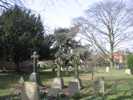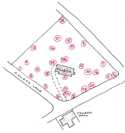Morton St DenisChurchyard
 View
of the View
of the
north side of the
churchyard |
The churchyard is open and is just under an acre in area with the church lying
almost central in the plot. There are lanes running on three sides of the churchyard,
which is enclosed by hedges. The fourth boundary is part hedge and part brick
wall. There is one entrance gate and the church is approached from here by
a Breedon gravel path. From the church door this becomes a mossy concrete path,
which then runs across the north side of the churchyard.
Many graves in the churchyard are unmarked.
The oldest existing gravestone dates from 1752, although one from 1744 was
excavated during remedial work and is now propped up near the church door.
The earliest marked graves are to be found on the south side of the church,
this being the side nearest the gate.
There are three box or chest tombs, dedicated to members of the Keyworth family,
in very poor condition, on this side of the church, but others are known to
have been located near the door until the early 1900s. These were removed when
the concrete path to the north was created in the early part of the 20th century
and the last pieces used to form new steps to the church in 2008.
An area near the northern boundary of the churchyard was in 1981 designated
as reserved for cremated remains.
 Plan of churchyard Plan of churchyard
showing positions
of the trees
|
There are many old and fine trees in the churchyard, notably a Sequoiadendron
giganteum (Wellingtonia), a Blue Atlantic Cedar and two magnificent Copper
Beeches. A number of mature Lime trees lie along the boundary hedges. At the
height of the summer, the church is consequently almost totally screened from
view.
Key to plan of trees in Churchyard
| 1-8 |
|
Lime |
| 9 |
|
Sycamore |
| 10-12 |
|
Yew |
| 13 |
|
Wellingtonia (topped 2009) |
| 14 |
|
Blue Atlantic Cedar |
| 15-18 |
|
Copper Beech |
| 19 |
|
Silver Birch |
| 20 |
|
Lawson Cupressus |
| 21 |
|
Deodar Cedar |
| 22 |
|
Conifer |
| 23 |
|
Black Pine |
| 24 |
|
Variegated Holly |
| 25 |
|
Holly |
| 26 |
|
Mulberry |
| 27 |
|
Walnut (Juglans Regia) |
| 28 |
|
Rowan |
|